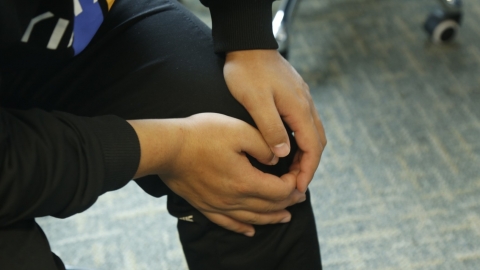What causes calf pain after a cold?
Generally, calf pain after a cold may be caused by psychological factors, overexertion, dehydration, fever, viral infection, and other reasons. Symptomatic treatment such as general care and medication may be needed. If discomfort persists, it is recommended to seek medical attention promptly and undergo appropriate treatment under a doctor's guidance. A detailed explanation is as follows:

1. Psychological Factors
Discomfort and anxiety caused by a cold may heighten pain perception, making individuals more sensitive to pain. Besides calf pain, symptoms such as anxiety, depression, and insomnia may also occur. It is recommended to practice relaxation techniques, such as deep breathing and yoga, to help alleviate tension and emotional stress.
2. Overexertion
If adequate rest is not obtained during a cold and excessive physical activity continues, calf muscles may become overworked, leading to pain. This is often accompanied by symptoms such as muscle fatigue and weakness. It is advised to rest sufficiently during a cold, avoid excessive activity, and perform local massage or warm foot baths to relax the muscles and relieve pain.
3. Dehydration
A reduced appetite and decreased water intake during a cold can easily lead to dehydration. Dehydration affects fluid balance in the body and may cause electrolyte disturbances, which can result in cramps and pain. In addition to calf pain, dehydration may also cause symptoms such as thirst, dark yellow urine, and dizziness. It is recommended to increase fluid intake by drinking more water or oral rehydration solutions to replenish lost fluids and electrolytes.
4. Fever
If a cold is severe enough to cause body fever, it can increase metabolic demand. When energy consumption is high, generalized weakness and muscle aches may occur, often accompanied by dizziness and headache. Therefore, calf pain may develop. It is recommended to take antipyretic and analgesic medications such as paracetamol tablets, ibuprofen sustained-release capsules, or diclofenac sodium sustained-release tablets as directed by a physician.
5. Viral Infection
Colds are typically caused by viral infections. These viruses may not only cause respiratory symptoms but also affect muscle tissues, leading to generalized muscle aches, including calf pain. This is usually accompanied by other cold symptoms such as fever, nasal congestion, and runny nose. It is recommended to use antiviral medications such as ribavirin tablets, acyclovir tablets, or oseltamivir capsules under a doctor's guidance to inhibit viral replication and alleviate symptoms.
It is advised to rest adequately during a cold to allow full recovery, avoid prolonged standing or walking, elevate the legs to promote blood circulation, and relieve pain.




